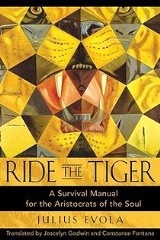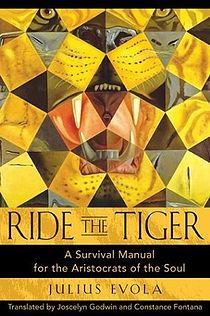
Ride the Tiger
Encyclopedia

Italy
Italy , officially the Italian Republic languages]] under the European Charter for Regional or Minority Languages. In each of these, Italy's official name is as follows:;;;;;;;;), is a unitary parliamentary republic in South-Central Europe. To the north it borders France, Switzerland, Austria and...
Traditionalist philosopher Julius Evola
Julius Evola
Barone Giulio Cesare Andrea Evola also known as Julius Evola, was an Italian philosopher and esotericist...
. The first English
English language
English is a West Germanic language that arose in the Anglo-Saxon kingdoms of England and spread into what was to become south-east Scotland under the influence of the Anglian medieval kingdom of Northumbria...
translation (translated by Joscelyn Godwin
Joscelyn Godwin
Joscelyn Godwin is a composer, musicologist and translator, known for his work on ancient music, paganism and music in the occult....
and Constance Fontana) was published by Inner Traditions in 2003 (ISBN 0-89281-125-0). Evola believes that the modern world has become totally corrupt and that the institutions and traditions of the ancient world that once allowed a person to fully realize his being have been lost. Ride the Tiger expands upon the Radical Traditionalist
Traditionalist School
The term Traditionalist School is used by Mark Sedgwick and other authors to denote a school of thought, also known as Integral Traditionalism or Perennialism to denote an esoteric movement developed by authors such as French metaphysician René Guénon, German-Swiss...
ideas which Evola developed in Revolt Against the Modern World
Revolt Against the Modern World
Revolt Against the Modern World: Politics, Religion, and Social Order in the Kali Yuga is a book by the philosopher and theorist Julius Evola, first published in Italy, in 1934...
and offers a solution to the problem of living in the modern world different from the reactionary revolution he argued for in Men Among the Ruins
Men Among the Ruins
Men Among the Ruins: Post-War Reflections of a Radical Traditionalist is a book by Julius Evola.First published as Gli uomini e le rovine in 1953, it is a statement of Evola's view of the political and social manifestations of our time...
. The principal metaphor of the book is its title. Evola argues that in order to survive in the modern world an enlightened or "differentiated man" should "ride the tiger". As a man, by holding onto the tiger's back may survive the confrontation, so too might a man, by letting the world take him on its inexorable path be able to turn the destructive forces around him into a kind of inner liberation. While the traditional world described in Revolt Against the Modern World would allow a man to fully realize his being in a united society, the world Evola describes in Ride the Tiger is much lonelier and even more pessimistic. Ride the Tiger, despite its pessimism, is a testament to Evola's belief that no matter how lost civilization may be, there always exists the ability for the individual person to live his life always looking "above" himself and thus achieving enlightenment.
Part 1: Orientations
- The Modern World and Traditional Man
- The End of a Cycle—"Ride the Tiger"
Part 2: In the World Where God Is Dead
- 3. European NihilismNihilismNihilism is the philosophical doctrine suggesting the negation of one or more putatively meaningful aspects of life. Most commonly, nihilism is presented in the form of existential nihilism which argues that life is without objective meaning, purpose, or intrinsic value...
—The Dissolution of Morals - 4. from the Precursors of Nihilism to the "Lost Youth" and the Protest Movement
- 5. Disguises of European Nihilism—The Socioeconomic Myth and the Protest Movement
- 6. Active Nihilism—Nietzsche
- 7. "Being Oneself"
- 8. The Transcendent Dimension—"Life" and "More Than Life"
- 9. Beyond TheismTheismTheism, in the broadest sense, is the belief that at least one deity exists.In a more specific sense, theism refers to a doctrine concerning the nature of a monotheistic God and God's relationship to the universe....
and AtheismAtheismAtheism is, in a broad sense, the rejection of belief in the existence of deities. In a narrower sense, atheism is specifically the position that there are no deities... - 10. Invulnerability—ApolloApolloApollo is one of the most important and complex of the Olympian deities in Greek and Roman mythology...
and DionysusDionysusDionysus was the god of the grape harvest, winemaking and wine, of ritual madness and ecstasy in Greek mythology. His name in Linear B tablets shows he was worshipped from c. 1500—1100 BC by Mycenean Greeks: other traces of Dionysian-type cult have been found in ancient Minoan Crete... - 11. Acting without Desire—The Causal Law
Part 3: The Dead End of Existentialism
- 12. Being and Inauthentic Existence
- 13. Sartre: Prisoner without Walls
- 14. Existence, "A Project Flung into the World'
- 15. Heidegger: "Retreating Forwards" and "Being-for-Death"—Collapse of Existentialism
Part 4: Dissolution of the Individual
- 16. The Dual Aspect of Anonymity
- 17. Destructions and Liberations in the New RealismNew realismNouveau réalisme refers to an artistic movement founded in 1960 by the art critic Pierre Restany and the painter Yves Klein during the first collective exposition in the Apollinaire gallery in Milan...
- 18. The "Animal Ideal"—The Sentiment of Nature
Part 5: Dissolution of Consciousness and Relativism
- 19. The Procedures of Modern Science
- 20. Covering up Nature—Phenomenology
Part 6:The Realm of Art—From "Physical" Music to the Drug Regime
- 21. The Sickness of European Culture
- 22. Dissolution in Modern Art
- 23. Modern Music and Jazz
- 24. Excursus on Drugs
Part 7: Dissolution in the Social Realm
- 25. States and Parties—Apoliteia
- 26. Society—The Crisis of Patriotic Feeling
- 27. Marriage and the Family
- 28. Relation between the Sexes
Part 8: The Spiritual Problem
- 29. The "Second Religiosity"
- 30. Death—The Right over Life
- Notes
- Index
From the Book
- "This restriction must be kept in mind. What I am about to say does not concern the ordinary man of our day. On the contrary, I have in mind the man who finds himself involved in today's world, even at its most problematic and paroxysimal points; yet he does not belong inwardly to such a world, nor will he give in to it. He feels himself, in essence, as belonging to a different race from that of the overwhelming majority of his contemporaries."

